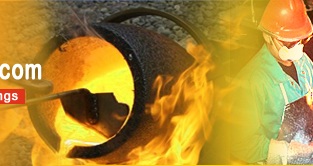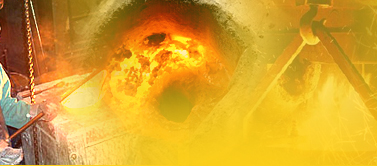Ceramic mold casting is a casting process in which materials are combined to make a mold which has rubber like consistency. Ceramic mold casting can be used for simple home foundry casting and also complicated, intricately designed industrial castings. This casting provides attractive looks for kitchenwares and decorative items.
 The Process
The Process: Ceramic mold casting, is an expendable process in which reusable and cheap patterns made of wood, metals, plastic or rubber are used. Patterns with intricate designs can be used since the molding material supports castings of complicate designs.
In ceramic mold casting, there are two different types of slurries used which are known as the true ceramic molding and shaw process. The patterns are kept is a flask and aggregate is poured over the pattern. Molding material sets in a rubber like consistency around the pattern. The rubber like consistency makes it easy for the pattern to be stripped out of the mold. The mold which is made in cope and drag form, is heated to make it harden. The strong mold is useful for high temperature pours, which can be done when the mold is still hot. With a creative bend of mind, ceramic molds can designed in any imaginative shapes.
The slurry used for ceramic mold casting can be made of a mixture of zinc, calcined, high-alumina mullite slurries or as in shaw process, the molding mixture consist of mixture to refractory filler, hydrolyzed ethyl silicate and a liquid catalyst. Generally the mold is heated in an oven by combining the shaw process and the lost wax process, the advantage of both the process can be gained.
 Applications of Ceramic Mold Casting:
Applications of Ceramic Mold Casting:
Using stainless steel and bronze, ceramic mold castingis best suited for casting a wide variety of products ranging from house hold goods to industrial tools. Some of casted products are kitchenwares like kettles, industrial products like impellers, complex cutting tools, plastic mold tooling etc.
Advantage of Ceramic Mold Casting::
- High temperature pours possible therefore suitable for steels and other alloys
- Creative complex designs can be made
- Can be used for mass production
- Casting with accurate dimensional accuracy possible
- Little machining is required therfore difficult-to machine alloys can be cast
- Supports both industry and home foundry operations
- Complicate and innovative designs can be casted.


